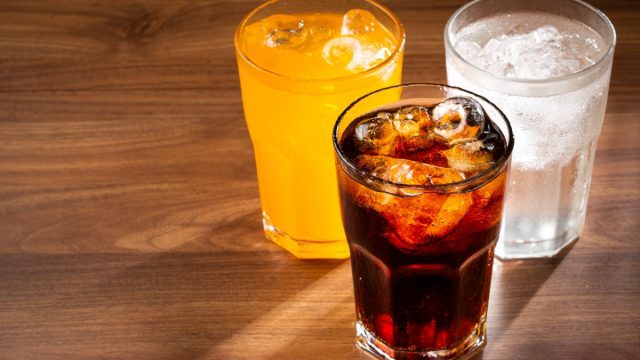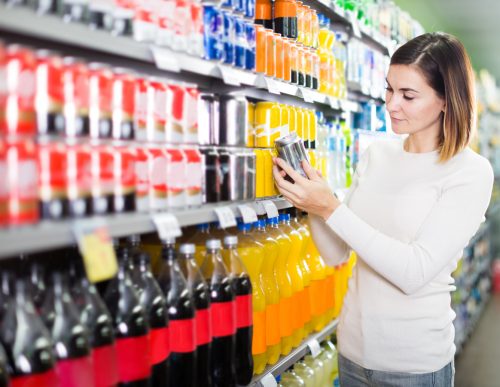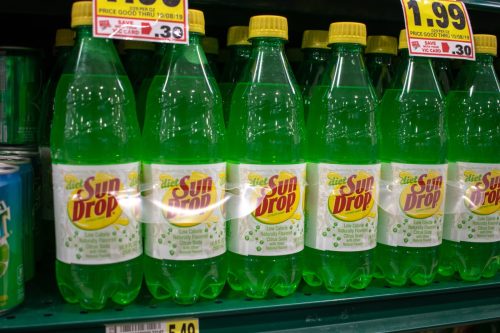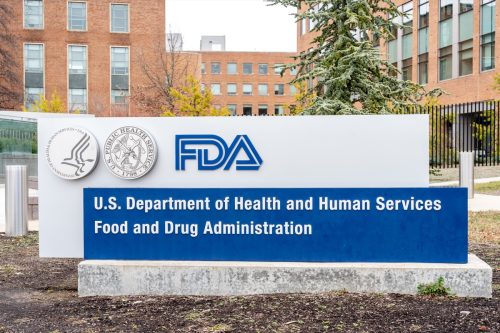FDA Warns Common Soda Ingredient Is Toxic to Your Thyroid

It’s generally understood that drinking soda every day isn’t great for our health. These beverages pack loads of extra sugar, and according to the University of California, Los Angeles (UCLA) Health, they’re linked to several different conditions like obesity, poor blood sugar control, and diabetes. But beyond sugar content, sodas have another ingredient that can be dangerous to your thyroid, prompting the U.S. Food and Drug Administration (FDA) to issue a new warning—and even propose a ban. Read on to find out what the agency wants to eliminate.
RELATED: Blood Pressure Meds Recalled After Oxycodone Found Inside, FDA Warns.
The agency said the ingredient “is no longer considered safe.”

In a Nov. 2 statement, James Jones, the FDA’s deputy commissioner for human foods, announced that the agency proposed revoking the regulation that authorized the use of brominated vegetable oil (BVO). According to the agency, using the ingredient in food “is no longer considered safe after the results of studies conducted in collaboration with the National Institutes of Health (NIH) found the potential for adverse health effects in humans.”
Currently, the FDA permits the use of BVO, a vegetable oil modified with bromine, in “small amounts” to keep ingredients in citrus-flavored drinks from separating and floating to the top of the beverage. It began regulating BVO in 1970 when it determined the ingredient wasn’t “Generally Recognized as Safe” (GRAS).
According to the Environmental Working Group (EWG), BVO is already banned from drinks in Europe and Japan—and the FDA acknowledged that California recently took steps to ban four food additives, including BVO.
RELATED: If You’re Using Any of These Toxic Hair Products, Stop Now, FDA Warns.
Research points to several negative health effects.

After previous research raised concerns about “potential toxicities” from BVO, the NIH conducted new studies in rodents and found that it was potentially toxic to the thyroid. According to Cleveland Clinic, this gland’s primary job is to control your metabolism, also producing and releasing certain hormones.
But beyond posing a threat to your thyroid, “BVO has been linked to numerous health hazards, including harm to the nervous system,” an EWG press release reads. “It can also build up in the body, and research has shown a connection between drinking large amounts of BVO-containing sodas over a long period of time and problems such as headaches, irritation of the skin and mucous membranes, fatigue and loss of muscle coordination and memory.”
RELATED: Common Statin Spikes Diabetes Risk, New Study Finds.
Several beverage manufacturers already replaced BVO, but not all.

The FDA notes that many beverage makers have “reformulated their products to replace BVO” and that “few beverages” still contain it. In the past, the ingredient was found in several drinks, including PepsiCo and Coca-Cola products, the Food Network reported.
PepsiCo did away with the additive in 2013, with Coca-Cola following suit in 2014. According to the EWG, brands faced pressure after a 2012 petition highlighted the danger of BVO—and garnered over 200,000 signatures.
However, BVO is still found in at least 90 beverage varieties, per the EWG, including Stewart’s Orange and Cream Flavored Soda, Sun Drop, Great Value Fruit Punch, and several other store-brand soda and fruit-flavored products. Complicating matters, with inflation continuing to plague American consumers, many are turning to these generic and off-brand products, which are typically more affordable.
RELATED: If You’re Eating Oysters in Any of These 6 States, Stop Now, FDA Warns.
An official ban has yet to be established.

Currently, the FDA has only proposed the ban, and a final decision won’t be made until after Jan. 17, 2024, when comments are received and a review process occurs, CNN reported.
“The proposed action is an example of how the agency monitors emerging evidence and, as needed, conducts scientific research to investigate safety related questions, and takes regulatory action when the science does not support the continued safe use of additives in foods,” Jones’ statement reads.
RELATED: For more up-to-date information, sign up for our daily newsletter.
Best Life offers the most up-to-date information from top experts, new research, and health agencies, but our content is not meant to be a substitute for professional guidance. When it comes to the medication you’re taking or any other health questions you have, always consult your healthcare provider directly.